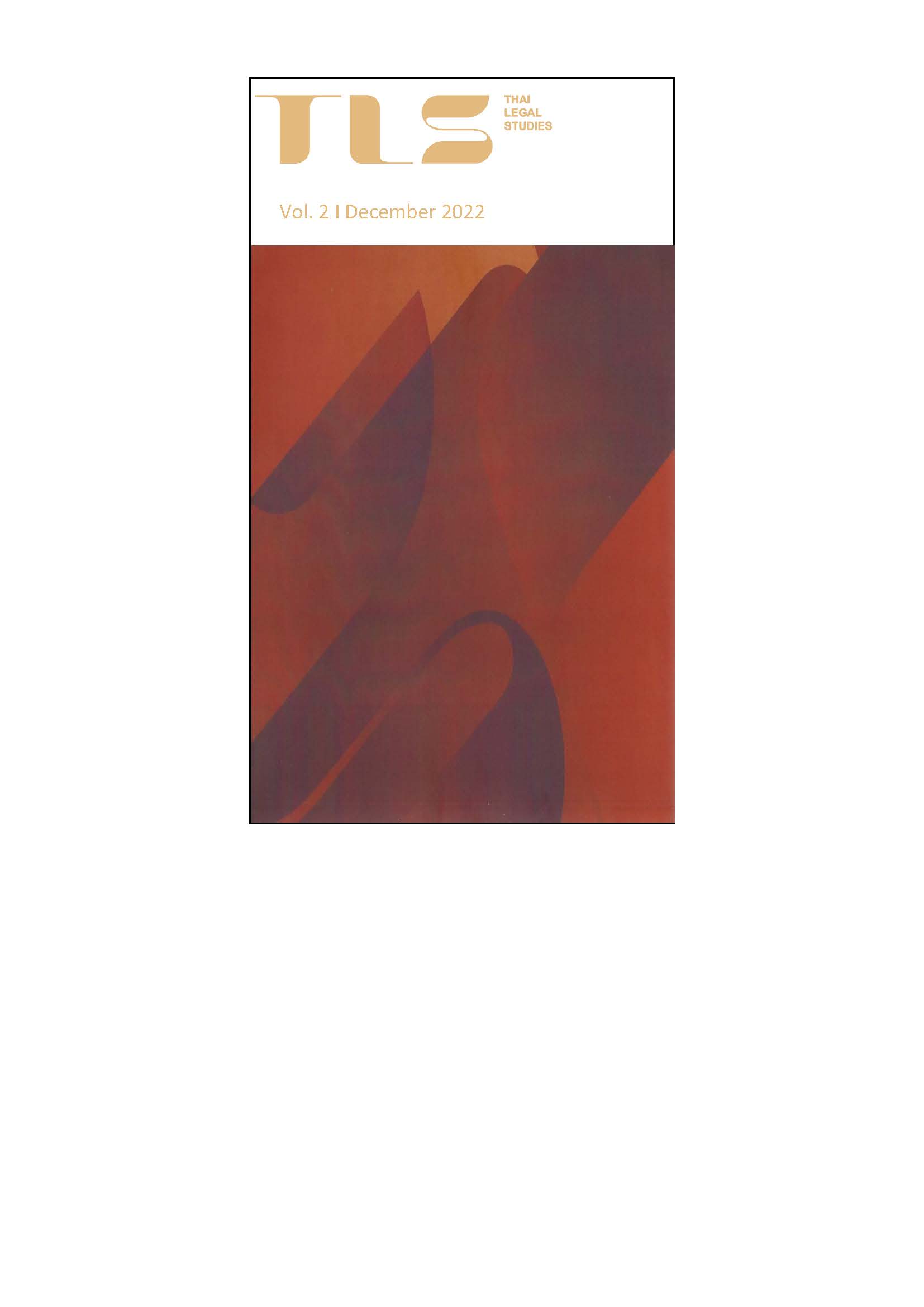When Queer Emotions Meet the Constitutional Promise: Dystopian Constitutionalism in Thai Popular Culture
DOI:
https://doi.org/10.54157/tls.261281Keywords:
Constitutional law, Thai constitutionalism, Dystopia, Queer legal theory, Law and emotion, Law and literatureAbstract
In classical constitutionalism, constitutional courts are dedicated guardians of the law, acting to promote fundamental rights. However, during an anticipated transition to democracy after the 2019 general election, substantial changes occurred in the pattern of judgments by the Constitutional Court of the Kingdom of Thailand (CC). These happened amidst popular demand for a democratic regime based on the rule of law. By squeezing heteronormative and royalist-nationalist ideologies into its legal reasoning, the CC has violated the constitutional rights of Thai citizenry and created a normative cosmos in which all forms of otherness are disregarded.
This article reads a utopian fantasy of Thainess in the Constitutional Court Decisions Nos. 19/2564 and 20/2564 in tandem with selected popular cultural texts on concepts of dystopian constitutionalism and queer jurisprudence. The goal is to analyze how disenfranchised voices neglected by the Court’s metanarrative may express queer negative emotions such as anger and fear, disclose the downside of constitutional promise, and offer playful readings of constitutional ideas and practices as Thailand struggles to attain the popular definition of constitutionalism.
References
“Activists Rally for Marriage Equality, Rewrite Court Ruling.” Prachatai (20 May 2022). https://prachatai.com/english/node/9834
Ahmed, Sara. The Promise of Happiness (Duke University Press 2010). https://doi.org/10.2307/j.ctv125jkj2
Bakhtin, Mikhail. Problems of Dostoevsky’s Poetics, edited and translated by Caryl Emerson, University of Minnesota Press (1984). https://doi.org/10.5749/j.ctt22727z1
Banović, Damir. “Queer Legal Theory.” In Dragica Vujadinović, Antonio Álvarez del Cuvillo, and Susanne Strands, eds, Feminist Approaches to Law (Gender Perspectives in Law, vol 1, Springer 2022) 73–91.
https://doi.org/10.1007/978-3-031-14781-4_4
Barber, Nicholas W. “Introduction: Constitutionalism.” (2015) 7 Oxford Legal Studies Research Paper 2. http://dx.doi.org/10.2139/ssrn.2565721
Becker, Gary S. A Treatise on the Family (Harvard University Press 1981).
Chutima Pragatwutisarn. “The Promise of Happiness: Political Imagination in Contemporary Thai Society.” (2021) 16 Philosophia OSAKA 1–19. https://doi.org/10.18910/78340
Crocker, Thomas P. “Dystopian Constitutionalism.” (2015) 18(2) University of Pennsylvania Journal of Constitutional Law 593. https://scholarship.law.upenn.edu/jcl/vol18/iss2/4/
“Demand for Thai Marriage Equality to Hit the Street at Sunday Protest.” Coconuts Bangkok (25 November 2021). https://coconuts.co/bangkok/news/demand-for-thai-marriage-equality-to-hit-the-street-at-sunday-protest/
“Doi Suthep Judicial Housing Construction Halted.” Bangkok Post (5 April 2018). https://www.bangkokpost.com/thailand/general/1441210/doi-suthep-judicial-housing-onstruction-halted
Fineman, Martha A. “Introduction: Feminist and Queer Legal Theory: Intimate Encounters, Uncomfortable Conversations.” (2009) Emory Public Law Research Paper N0. 09-75. https://papers.ssrn.com/sol3/papers.cfm?abstract_id=1516647#
Fineman, Martha A. “The Sexual Family. Feminist and Queer Legal Theory: Intimate Encounters, Uncomfortable Conversations.” (2009) Emory Public Law Research Paper No. 09-74.
Glaser, Henning. “Permutations of the Basic Structure: Thai Constitutionalism and the Democratic Regime with the King as Head.” In Andrew Harding and Munin Pongsapan (eds), Thai Legal History (Cambridge University Press 2021) 233–51. https://doi.org/10.1017/9781108914369.017
Hoffmann, Frank W. Rhythm and Blues, Rap, and Hip-hop (Infobase Publishing 2006).
“‘Hunger Games’ Salute Used to Protest Coup D’état in Thailand.” Wikinews (5 June 2014). https://en.wikinews.org/wiki/%27Hunger_Games%27_salute_used_to_protest_coup_d%27%C3%A9tat_in_Thailand?dpl_id=1406837
“Iconic Thai Rappers Get Human Rights Award.” (Václav Havel Library Foundation, 2019). https://www.vhlf.org/news/iconic-thai-rappers-get-human-rights-award/
Jackson, Peter A. “Non-normative Sex/Gender Categories in the Theravada Buddhist Scriptures.” (1996). https://openresearch-repository.anu.edu.au/bitstream/1885/41884/1/theravada.html
Jirayudh Sinthuphan, and Thanchanok Ruendhawil. “Fighting for Love: A Battle for Equal Marriage Rights in Thailand.” (2022) 7 Asia Democracy Research Network, 1–6.
Kitpatchara Somanawat. “Judicialization of Emotion: The Legal Regime of Annoyance Among Thai Middle Class.” (2021) 22 Journal of Humanities (supplemental issue) 73–94 [in Thai].
Moylan, Tom. “The Necessity of Hope in Dystopian Times: A Critical Reflection.” (2020) 31(1) Utopian Studies 164. https://doi.org/10.5325/utopianstudies.31.1.0164
Nussbaum, Martha C. Poetic Justice: The Literary Imagination and Public Life. (Boston: Beacon Press 1995).
Okin, Susan Moller. Justice, Gender and the Family (Basic Books 1989).
Pech, Laurent. “The Concept of Chilling Effect: Its Untapped Potential to Better Protect Democracy, Rule of Law, and Fundamental Rights in the EU.” (Open Society Foundation 2021). https://www.opensocietyfoundations.org/uploads/c8c58ad3-fd6e-4b2d-99fa-d8864355b638/the-concept-of-chilling-effect-20210322.pdf
Phattaranit Kiatthanawit. “Siamese State and Society and the Management of Emotion: Regime of Horror, 1851–1910.” (Master Diss., Chiang Mai University 2019).
PQ, Rory. “Hip Hop History: From the Streets to the Mainstream.” Icon Collective (13 November 2019).
“Protesting Thai Reader of Orwell's 1984 Dragged Off by Police in Bangkok.” South China Morning Post (23 June 2014). https://www.scmp.com/news/asia/article/1538616/protesting-thai-reader-orwells-1984-dragged-police-bangkok
Rich, Adrienne. “Compulsory Heterosexuality and Lesbian Existence.” (1980) 5 Signs 631–60. https://doi.org/10.1086/493756
Rosenfeld, Michel. “Deconstructing Constitutional Identity in Light of the Turn to Populism.” (2022) 659 Forthcoming Cardozo Legal Studies Research Paper.
Scholz-Karl, Julia. “Behind the Theoretical Debate Between Hans Kelsen and Carl Schmitt: The Nineteenth Century Constitutionalism and German Public Law.” (2021) 7 UNIO – EU Law Journal 11. https://doi.org/10.21814/unio.7.2.3101
Sciullo, Nick J. “Queer Phenomenology in Law: A Critical Theory of Orientation.” (2019) 39 Pace Law Review 667. https://doi.org/10.58948/2331-3528.2000
Shaw, Julia J. A. Law and the Passions: Why Emotion Matters for Justice (Routledge 2021).
Stanitzek, George. “Text and Paratext in Media.” (2005) 32 Critical Inquiry 27–42. https://doi.org/10.1086/498002
Thongchai Winichakul. “Moments of Silence: The Unforgetting of the 1976 Massacre in Bangkok.” (2009) 123th Annual Meeting, American Historical Association Conference.
Thongchai Winichakul. “The Quest for ‘Siwilai’: A Geographical Discourse of Civilizational Thinking in the Late Nineteenth and Early Twentieth-Century Siam.” (2000) 59 The Journal of Asian Studies 528–49. https://doi.org/10.1017/S0021911800014327
“Watchdog Clears Thai Junta Deputy Over Luxury Watches.” Reuters (28 December 2018). https://www.reuters.com/article/us-thailand-politics-idUSKCN1OR0PC
Sources in Thai
GMMTV. “Not Me #สมรสเท่าเทียม.” [Not Me #samesexmarriage.] (2022) [video] Facebook. https://m.facebook.com/watch/?v=1002625070349232&_rdr
ชนาธิป ตติยการุณวงศ์. “รักที่มีเงื่อนไข: ความสัมพันธ์อันอิหลักอิเหลื่อระหว่างรัฐไทยกับ LGBTQ.” [Chanatip Tatiyakaroonwong. “Conditional Love: An Awkward Relationship Between Thailand and LGBTQ.”] (25 August 2019). https://spectrumth.com/2019/07/25/รักที่มีเงื่อนไข-ความสั
ธงชัย วินิจจะกูล. “นิติรัฐอภิสิทธิ์และราชนิติธรรม: ประวัติศาสตร์ภูมิปัญญาของ Rule by Law แบบไทย.” (นิตยสาร Way 2563). [Thongchai Winichakul. “Legal Privileged State and Royalist Rule of Law: Genealogy of Thai-Style Rule by Law.” (Way Magazine 2020).]
“ม็อบเปิดเพลงประเทศกูมี โห่ไม่พอใจ หลังแกนนำ แจ้ง รบ.ประกาศสถานการณ์ฉุกเฉินใน กทม.แล้ว.” [“The Demonstration Played the Song Which My Country Has After the State of Emergency Declaration in Bangkok.” Matichon (15 October 2020).] https://www.matichon.co.th/politics/news_2395238
“มุมมอง วรเจตน์ ภาคีรัตน์ ต่อคำวินิจฉัยศาลรัฐธรรมนูญ คดีล้มล้างการปกครองของ 3 ราษฎร.” [“Worachet Pakeerut’s View on the Constitutional Court’s Overthrow the Monarchy Ruling.”] Voice TV (3 January 2022). https://www.voicetv.co.th/read/xB_xqDbJ6
สมชาย ปรีชาศิลปกุล. เพศวิถีในคำพิพากษา (เกวลีพริ้นติ้ง 2558). [Somchai Prichasilapakun. Sexuality in Judgment (Kaewalee Printing 2015).]
Published
Issue
Section
License
Copyright (c) 2023 Paweenwat Thongprasop, Papawin Pechnil

This work is licensed under a Creative Commons Attribution 4.0 International License.
Authors retain copyright and publishing rights without restrictions, but grant Thai Legal Studies the right of first publication in English and to distribute the work under a Creative Commons Attribution 4.0 International Public License (“CC BY 4.0”). It allows others to freely share the work, including the making of translations. There is no charge or fee for readers to immediately view published articles or content, and users are allowed to read, download, copy, distribute, print, search, link to the full texts of the articles, or use them for any other lawful purpose, without asking prior permission from Thai Legal Studies or the author(s), the only requirement being that an acknowledgement is given of the work’s authorship and its initial publication in English by Thai Legal Studies.







